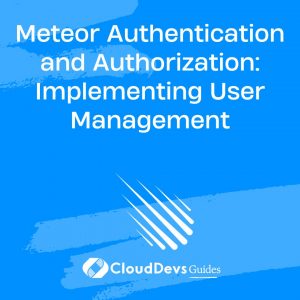Meteor Courses and Certifications to Boost Your Coding Skills in 2023
Meteor has risen as a prominent programming language for a wide array of applications, and it has garnered extensive acceptance across businesses of varying sizes. Meteor empowers developers to create resilient applications efficiently, and the demand for Meteor developers is on a consistent rise.
Table of Contents
If you are enthusiastic about improving your Meteor programming abilities or embarking on a career in Meteor development, contemplating certification programs or enrolling in pertinent courses can offer significant benefits. In this article, we will delve into some of the leading Meteor certification choices and courses accessible in 2023.
1. Introduction to Meteor.js by Coursera
The Introduction to Meteor.js Development course on Coursera is part of the Responsive Website Development and Design Specialization. This course is designed to help you create a complete, multi-user website using the Meteor.js framework and MongoDB. The course instructor is Dr. Matthew Yee-King and the duration is approximately 25 hours
In this course, you will learn how to create a complete, multi-user website using the Meteor.js framework and MongoDB. You will implement user authentication, security features, reactive templates, and routing using an iron router. The course covers various topics such as working with the Meteor.js packaging system, writing Meteor.js templates that can reactively display data, using insert, remove, and update operations on MongoDB, writing MongoDB data filters to search for and sort data, adding user authentication functionality to a website, and implementing basic security features.
The course consists of 5 modules and includes quizzes and assessments to test your understanding of the concepts. Upon completion of the course, you will receive a shareable certificate that you can add to your LinkedIn profile.
The course modules are:
- Introduction to Meteor.js Development: This module serves as the initial stepping stone, offering an in-depth exploration of Meteor.js along with its wide-ranging development capabilities. It lays the foundation for understanding the full potential of Meteor.js in modern web development.
- Reactive Templates and Data Display: In this segment, we delve into the art of crafting dynamic templates to present data dynamically. Explore how to create engaging and interactive data presentations.
- MongoDB Operations and Data Management: Within this section, you’ll gain expertise in performing MongoDB operations, including inserting, removing, and updating data. Discover the essential skills for managing data in your MongoDB databases effectively.
- User Authentication and Security: In this module, you’ll delve into the vital aspects of user authentication and fundamental security practices. Learn how to fortify your applications with robust authentication mechanisms and essential security measures to safeguard user data and system integrity.
- Routing with Iron Router: Within this topic, you’ll master the art of navigation and routing in your Meteor.js application. Discover how to create seamless user experiences by efficiently directing users through your web application’s various sections and pages.
The course comprises quizzes and assessments to evaluate your comprehension of the material. Upon successful completion, you will receive a shareable certificate that can enhance your professional profile, including your LinkedIn credentials.
2. Meteor 101: The Fundamentals by Meteor University
Meteor 101: The Fundamentals is a beginner-level course that teaches you the basics of Meteor.js. You will learn how to create a simple web app using Meteor.js and MongoDB, how to implement user authentication and accounts, how to use Meteor packages and templates, and how to deploy your app to the web.
The course is divided into eight sections, each with video lectures, quizzes, and assignments. The course also has a forum where you can interact with other students and instructors. The course is free and self-paced, so you can start and finish it anytime you want.
The course modules are;
- Starting with Meteor: This module introduces you to the basics of Meteor.js, such as how to install it, how to create a simple web app, how to use the Meteor command line tool, and how to use the Meteor web browser console. You will also learn about the Meteor architecture, the Meteor project structure, and the Meteor reactive data system.
- MongoDB Collections and Schemas: This module teaches you how to use MongoDB, the database that Meteor.js uses to store and manipulate data. You will learn how to create and use MongoDB collections, how to define and validate schemas for your data, and how to perform CRUD (create, read, update, delete) operations on your data.
- Login and Accounts: This module shows you how to implement user authentication and accounts in your Meteor app. You will learn how to use the accounts-ui and accounts-password packages to create a login and registration system, and how to use Meteor. user() and Meteor.userId() functions to access the current user information, how to use the check, and Match packages to validate user input.
- Mobile Apps and Native Features with Cordova: This module explains how to use Cordova, a framework that allows you to build mobile apps with web technologies. You will learn how to use the Meteor run command to run your app on an emulator or a device, how to use the Meteor add-platform command to add iOS and Android platforms to your app, how to use the Meteor build command to create a production-ready app, and how to use the Meteor add Cordova: plugin command.
- Business Logic and Code Organization: This module covers how to organize your code and implement business logic in your Meteor app. You will learn how to use the Meteor create –full command to create a scaffolded app with a recommended code structure, how to use the imports and exports syntax to modularize your code, how to use the Meteor shell command to interact with your app from the terminal, and how to use the ValidatedMethod package.
- Advanced Deployment Strategies: This module teaches you how to deploy your Meteor app to the web. You will learn how to use the Meteor deploy command to deploy your app to the free Meteor.com hosting service, how to use the Meteor settings command to configure your app settings, how to use the Meteor logs command to view your app logs, and how to use the Meteor mongo command to access your app database.
- Scaling Up: This module guides you on how to scale up your Meteor app to handle more users and traffic. You will learn how to use the Meteor update command to update your app to the latest Meteor version, how to use the Meteor npm install command to install and update npm packages, and how to use the Meteor test command to test your app with various testing frameworks.
This course is free of charge and you can do this at your phase.
3. Meteor and React for Realtime Apps
Meteor and React for Realtime Apps is a course offered by Udemy that teaches you how to create interactive web apps with Meteor and React. You will learn the fundamentals of both technologies and how to use them together to build secure, dynamic, and responsive apps.
The course covers topics including React basics, such as JSX, props, state, and eventing, and Meteor basics, such as collections, methods, publications, and subscriptions. Moreover, User authentication and security with Meteor, routing and navigation with React Router, and Mobile app development with Cordova. There is also a part called testing and debugging with Meteor tools, and deployment and scaling with Meteor hosting services.
The course modules are;
- The Basics of Any Meteor App: This module introduces you to the basics of Meteor.js, such as how to install it, how to create a simple web app, how to use the Meteor command line tool, and how to use the Meteor web browser console. You will also learn about the Meteor architecture, the Meteor project structure, and the Meteor reactive data system.
- A React Primer: This module teaches you the basics of react.js, such as JSX, props, state, and eventing. You will learn how to create and use react components, how to pass data and handle events between components, and how to use state to manage dynamic data in your app.
- On to Meteor: This module shows you how to use Meteor.js with react.js to build a full-stack web app. You will learn how to create and use MongoDB collections, how to publish and subscribe data between the server and the client, how to create and use Meteor methods and publications, how to implement user authentication and security features, and how to use routing and navigation with React Router.
- Getting More Complex: Meteor Methods: This module covers how to use Meteor methods to implement more complex app logic and functionality. You will learn how to create and use validated methods, how to handle errors and exceptions, how to use Meteor.call and Meteor.apply, and how to use Meteor.bindEnvironment and Meteor.wrapAsync.
- Advanced Deployment Strategies: This module teaches you how to deploy your Meteor app to the web. You will learn how to use the Meteor deploy command to deploy your app to the free Meteor.com hosting service, how to use the Meteor settings command to configure your app settings, how to use the Meteor logs command to view your app logs, and how to use the Meteor mongo command to access your app database.
- Scaling Up: This module guides you on how to scale up your Meteor app to handle more users and traffic. You will learn how to use the Meteor update command to update your app to the latest Meteor version, how to use the Meteor npm install command to install and update npm packages, how to use the Meteor test command to test your app with various testing frameworks, and how to use the Meteor debug command to debug your app with various debugging tools.
The course is suitable for all levels of developers who want to master Meteor and React. It has 9 hours of video content, 111 lectures, and 1,985 ratings.
4. Master Meteor – Meteor JS From the Ground Up by Udemy
Master Meteor – Meteor JS From the Ground Up is a course offered by Udemy that teaches you Meteor.js from scratch. You will learn how to install Meteor on Windows, Mac OS, and Linux, how to create dynamic websites, how to implement authentication using Meteor packages, and how to use routing in Meteor.
The course is suitable for all levels and has 4.5 hours of video content, 80 lectures, and 33 ratings.
Introduction: This module introduces you to the course objectives, the instructor, and the prerequisites. You will also learn what is Meteor, what this course will cover, who this course is for, why use Meteor, and the key technologies in Meteor.JavaScript Basics: This module teaches you the basics of JavaScript, such as variables, data types, operators, conditional statements, loops, functions, objects, and prototypes. You will also learn about closures, object.prototype, and code download.
- Understanding Meteor: This module explains how Meteor works, how to install it, how to create your first Meteor application, and how to use the Meteor command line tool and web browser console.
- Meteor Basics: This module covers the basics of Meteor, such as template inclusion helpers, #if helper, #with helper, and #each helper.
- Templates, Collections, and Event Handlers: This module shows you how to use templates, collections, and event handlers in Meteor. You will also learn how to create a fitness tracker app, how to make your templates functional, and how to create and use collections.
- Authentication, Session, and Server Side of Meteor: This module teaches you how to implement the authentication, session, and server-side of Meteor. You will also learn how to use Meteor packages, how to implement Google sign-in, and how to explore {{> loginButtons}} and {{currentUser}}.
- Bootstrap, Favicon, and Exploring Shadow DOM: This module introduces you to Bootstrap, favicon, and exploring Shadow DOM. You will also learn how to code download.
- Refactoring Our Application: This module guides you on how to refactor your fitness tracker app and how to code download.
- Routing: This module explains how to use routing in Meteor and how to create routes. You will also learn how to code download.
- Deployment: This module shows you how to deploy your Meteor app to the web. You will also learn how to use the Meteor deploy command, the Meteor settings command, the Meteor logs command, the Meteor Mongo command, and other deployment options, such as Galaxy, Heroku, and AWS. You will also learn how to code download.
- Scaling Up: This module teaches you how to scale up your Meteor app to handle more users and traffic. You will also learn how to use the Meteor update command, the Meteor npm install command, the Meteor test command, the Meteor debug command, and the Meteor APM package. You will also learn how to code download.
The course also provides you with code downloads, quizzes, and assignments to help you practice and master Meteor.js.
5. Learn MeteorJS By Building 10 Real World Projects by Udemy
Learn MeteorJS By Building 10 Real World Projects by Udemy is a course that teaches you how to use the Meteor framework to build web solutions. You will learn how to build 10 real-world projects using Meteor.js and MongoDB, such as a todo app, a product review app, a custom login system, a help ticket system, and more. You will also learn the core concepts of JavaScript-based framework, the MEAN stack technologies, and how to deploy your app to the web.
The course is suitable for all levels and has 15 hours of video content, 80 lectures, and 295 ratings.
- Course Introduction: This module introduces you to the course objectives, the instructor, and the prerequisites. You will also learn what is Meteor, what this course will cover, who this course is for, why use Meteor, and the key technologies in Meteor.
- myTodos App: This module teaches you how to create a simple to-do app using Meteor and MongoDB. You will learn how to display, add, update, and delete todos, how to implement user authentication and methods, how to subscribe and publish data, and how to deploy your app to the web.
- Microposts: This module shows you how to create a microblogging app using Meteor and MongoDB. You will learn how to set up routing and navigation, how to build the UI, how to implement user accounts and creation, how to display and create posts, and how to secure your app.
- FAQ Component: This module explains how to create a FAQ component using Meteor and MongoDB. You will learn how to use packages and routers, how to create an accordion UI, how to display FAQ in accordion, and how to use the Houston admin panel.
- SpatIt Product Reviews: This module guides you on how to create a product review app using Meteor and MongoDB. You will learn how to read products and categories, how to add products and implement validation, how to display products and reviews, how to create reviews and implement ratings, and how to implement accounts and security.
- Custom Login System: This module teaches you how to create a custom login system using Meteor and MongoDB. You will learn how to create a login and register UI, how to implement user registration and validation, how to implement user login, and how to create a dashboard and access control.
- Help tickets: This module shows you how to create a help ticket system using Meteor and MongoDB. You will learn how to create files and layout, how to design and implement a custom login system, how to add and list tickets, how to create a ticket page and reply, and how to design and implement staff and departments.
- WebPlans: This module explains how to create a web plans app using Meteor and MongoDB. You will learn how to set up Meteor skeleton, how to create a default admin user, how to implement plans CRUD, and how to implement subscriber functions.
- Codefolio: This module guides you on how to create a code portfolio app using Meteor and MongoDB. You will learn how to integrate a template, how to create inner and admin page markup, how to implement admin login functions, how to implement blog post-CRUD, and how to implement projects CRUD.
- MyResolutions: This module teaches you how to create a resolutions app using Meteor and MongoDB. You will learn how to create a resolutions collection, how to display resolutions, how to add resolutions, how to update resolutions, how to remove resolutions, and how to implement accounts and security.
- ImageShare: This module shows you how to create an image-sharing app using Meteor and MongoDB. You will learn how to use the FS Collection package, how to upload and display images, how to add image properties, how to filter images, and how to implement user accounts and likes.
- ChatApp: This module explains how to create a chat app using Meteor and MongoDB. You will learn how to use the Bootstrap package, how to create a chat UI, how to implement user accounts and messages, how to display messages, and how to secure your app.
By the end of this course, you will receive a certificate of completion.
Here is a comparison table of the five Meteor.js courses mentioned above.
| Course/ program | Cost | Level | Duration | Study mode |
|---|---|---|---|---|
| Introduction to Meteor - Coursera | Free | Beginner / Intermediate | 25 hours | Online |
| Meteor 101: The Fundamentals | Free | Beginner | 60 hours | Online |
| Meteor and React for Realtime Apps | $74.99 | Intermediate / Advanced | 9 hours | Online |
| Master Meteor - Meteor JS From the Ground Up | $19.99 | Beginner | 4.5 hours | Online |
| Learn MeteorJS by Building 10 Real World Projects | $19.99 | Intermediate | 15 hours | Online |
As shown in the table provided, there are differences in terms of course duration, costs, and skill requirements across various Meteor programming courses. Some courses might be more expensive, while others are tailored for individuals with intermediate to advanced skills, assuming they already have the necessary foundational knowledge. When choosing the right Meteor programming courses, it is essential to carefully assess your own skill level, financial limitations, and specific goals.
Conclusion
Taking a Meteor certification or course in 2023 can greatly enhance your career opportunities. With proper training, you can elevate your skills as a Meteor developer and take on exciting projects. Whether you are a novice or a seasoned coder, there is a course or certification program available to enhance your abilities.
Table of Contents







